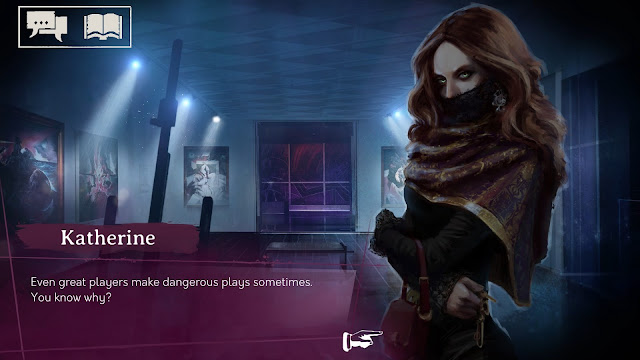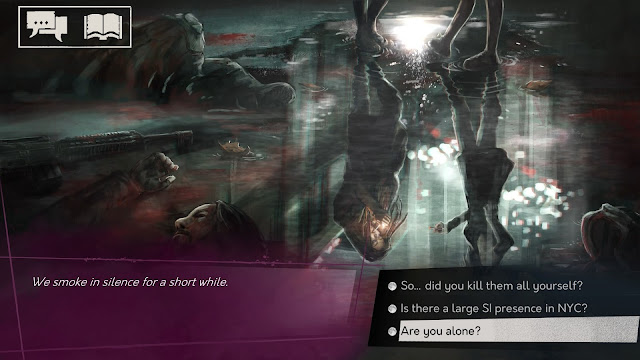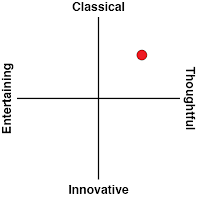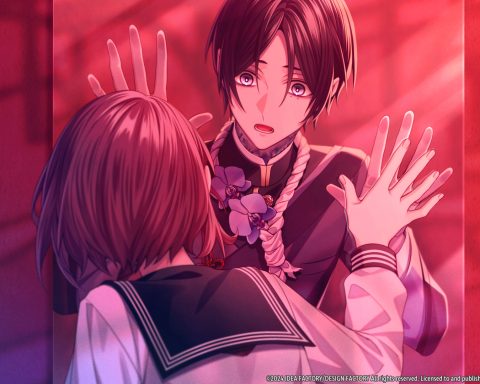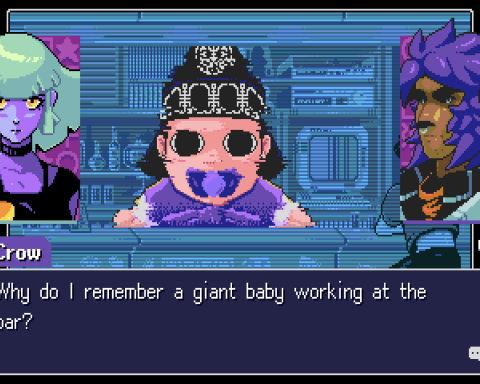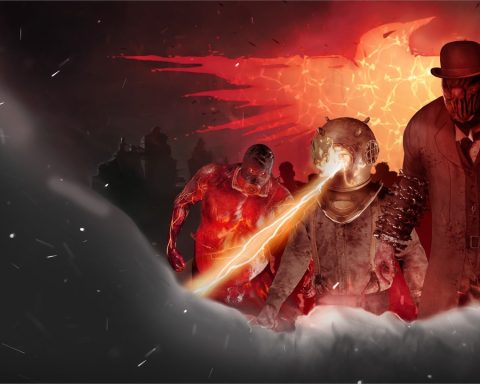Review by Matt S.
Earlier this year we reviewed Vampire: The Masquerade – Coteries of New York. It was a decent attempt to bring White Wolf’s modern gothic pen-and-paper vision to video game consoles via the visual novel medium. The developers are on to something with this license and property, and they seem to know it too, having turned around Shadows of New York in rapid time.
Going into this “standalone expansion,” it was always going to be the case that it wasn’t going to address the issues of Coteries of New York. There just wasn’t enough time to rethink the approach to the game so quickly. Instead, it was always going to be an extension of everything that game did, both good and bad. Before I get into that, though, I will say up-front that this game does assume that you’ve played its predecessor. There aren’t many gameplay mechanics, with this being a visual novel and all, but what mechanics are there are not explained, and so when you’re first presented with a dialogue tree in which some of the options have little icons next to them, you’re not going to know what those icons mean unless you’re familiar with Coteries. It’s a minor thing, but it highlights how this game is best viewed as DLC. Even though it’s being sold as a separate thing, it probably shouldn’t be.
Now, what Shadows of New York does get right is the sense of vampire society, culture, and sheer decadence abound within the underground of New York’s nightlife. There’s a real sense of modern Babylon (as in, “Babylon of the Bible”) that the game’s writers and artists want to convey; of a city so drowning in vice and its political games that it’s ultimately doomed, and Shadows of New York is tonally spot-on for this. The level of detail in the character and background art is unparalleled (and the developers know this, as they shove the text – of a visual novel – into a corner so as to not obstruct the visuals), and sets a powerful scene. Unlike most visual novels, environments are animated too, giving the game a moving picture book-like aesthetic and the impact is striking.
The narrative, meanwhile, is written well, though just as I observed with this game’s predecessor, it’s also a step or two lower than Anne Rice’s vampire yarns. There’s a punk-like aggression to the characters and situations, which the writers use effectively to bounce off various nihilistic and hyper-critical socio-cultural musings about the world that we live in. This time around you follow the story of a journalist that is turned to vampire immediately after being fired for chasing a story about the rich and famous that becomes inconvenient to the powers-that-be. Once turned into a vampire, her skills in investigation become valuable as she’s asked to look into a murder that comes as a result of the labyrinthine politics of vampire society. Make no bones about it, this little series goes some pretty dark and even transgressive places with its writing, though it always pulls just short of going all in. It’s the kind of pop-edgy stuff you’d expect from a decent pen-and-paper RPG writer, rather something designed to truly shock the audience into contemplation.
What really lets the narrative down – and this is a carry-over issue from the previous game too – is the desperate effort by the writers to infuse the text with real-world context. It comes at a rapid-fire pace with the narrative name-dropping Jeffrey Epstein one moment and then, some short paragraphs later, referencing the lawsuit that was brought against Gawker media. I think I understand the purpose of these, as an effort to “sell” the idea that this stuff is happening in a realistic depiction of the world, and through that lending weight to the various social and cultural points of commentary that the game wants to make when dealing with vampires, who most assuredly don’t exist in the real world. But it’s laboured and inauthentic in application, and each real-world reference made in the script is simply a statement of record, noted down via the narrative rather than thematically explored. What’s more, the references are so specific to time that they date the game. Shadows of New York will lose its relevance, and quickly. Within a couple of years, most of these references being made will be barely remembered by anyone who might pick the game up.
I do admire visual novels that want to explore real-world subjects, but for them to work, the analysis needs to go beyond name-dropping and jokey one-liners. Vampire: The Masquerade’s punk aesthetics could be the ideal platform for exploring a society as fundamentally broken as America right now, but the format the developers have decided on here comes across as a juvenile call for relevance more than a meaningful effort at contextualisation.
Shadows of New York is much briefer than its predecessor, and you’ll run through to an ending in just a few hours. There are multiple endings and they deviate enough to be worth chasing, but the overall brevity of the game means that the developers needed to strip out many of the more complex game-like elements that they had running through the original game. I don’t have strong feelings on this either way, but it is worth noting that the abridgement in making this DLC a standalone release impacts on the game at all levels.
I’m left with the exact same impression with Shadows of New York as I was with Coteries of New York from earlier this year. This development team has talent, writes a quality visual novel, understands the aesthetics and tone of Vampire: The Masquerade, and you get the feeling that they can achieve some incredible things with the property. To get there, though, they need to graduate from writing a pen-and-paper RPG to something more literary, because unfortunately for them, in deciding to joust with exceptionally complex, challenging subjects like they have with Shadows of New York, they’re being unseated far too often by a lack of insight and complex analysis, leaving their work feeling a touch too shallow for its own good.
– Matt S.
Editor-in-Chief
Find me on Twitter: @mattsainsb
The critic was provided a code for the purposes of review.


